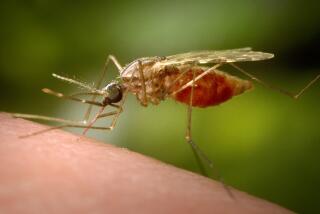Vaccine Proves Effective on AIDS-Like Virus
- Share via
In a major advance toward an AIDS vaccine, researchers at Tulane University in Louisiana have successfully immunized eight of nine monkeys against infection with one strain of an AIDS-like virus.
The new findings, reported in today’s issue of the journal Science, provide “unambiguous proof” that a vaccine to protect humans against the deadly disease is possible, said Michael Murphey-Corb of Tulane’s Delta Regional Primate Research Center in Covington, La., the leader of the research team.
The findings confirm and extend previous reports of limited success in immunizing monkeys against much higher doses of the AIDS-like virus by researchers at the New England Regional Primate Center in Southborough, Mass., and at UC Davis.
This is the “most dramatic success” to date, said Dani P. Bolognesi, an AIDS vaccine researcher at the Duke University Medical Center, who wrote an editorial in Science about the Tulane findings. “We are getting successes where we were getting failures before,” Bolognesi said in an interview. This is “very uplifting to everyone.”
The Tulane vaccine is a chemically inactivated preparation of the whole simian immunodeficiency virus, or SIV. The monkey virus is the closest animal counterpart of the human immunodeficiency virus, or HIV. It also causes a fatal AIDS-like illness in monkeys.
“A vaccine proven to be effective in protecting rhesus monkeys from infection and disease after experimental challenge with SIV will likely be effective in protecting humans at risk for HIV infection and AIDS,” the report said.
Vaccines prevent infections and disease by stimulating the immune system to produce specialized white blood cells and protective molecules called antibodies. As a result, the immune system of a vaccinated animal or human can recognize and eliminate viruses or bacteria before they cause health problems.
Many AIDS vaccine researchers, including Murphey-Corb and Bolognesi, still feel that it will take another decade to develop a safe and effective human AIDS vaccine. But they said the success in animal experiments was a necessary step along the way that would focus future human research and dispel doubts about eventual success.
AIDS research “has taken a giant leap forward,” said Dr. Wayne Koff, who is in charge of vaccine research for the National Institute for Allergy and Infectious Disease’s AIDS program. “The issue has changed from if we can develop an AIDS vaccine to when can we develop a vaccine.”
Ronald C. Desrosiers of the New England Regional Primate Center cautioned that the Tulane results were achieved in “an idealized, optimized laboratory setting where many factors are stacked in favor of a successful outcome.” Desrosiers’ research team has obtained similar results.
Murphey-Corb said: “We have one thing that works and it works well. (But) it is not ready for human trials.”
At a New Orleans press conference, she said the next steps include refining the methods for preparing and administering the vaccine and developing a vaccine that prevents infection by different varieties of the monkey virus.
So far, the vaccine has been tested against the same viral strain that the monkeys were immunized against. Developing a vaccine that protects against diverse strains is crucial, because humans can be infected by many strains of the AIDS virus.
In addition, a chemically inactivated whole virus may not be safe enough for human use, because of concerns that some of the live viral particles would not be killed by the chemical treatment. As a result, preliminary vaccine tests in humans have largely involved so-called “sub-unit” vaccines, made from parts of the AIDS virus, which are not infectious. Such vaccines are less likely to be toxic than is a whole virus vaccine, but some researchers believe that they are also less likely to work.
The Tulane experiments required several years to complete. They involved 18 rhesus monkeys. About half the monkeys were immunized against SIV infection and the others served as controls.
The crucial experiment involved the nine monkeys who received a series of three vaccine injections as well as a booster injection one year later. Two weeks after their booster injections, nine monkeys were given intravenous injections of SIV. The amount injected was 10 times the minimum amount of SIV required to infect and cause the AIDS-like illness in unvaccinated monkeys.
In extensive testing, laboratory evidence of SIV infection was found in only one of the nine vaccinated monkeys during more than one year of follow-up, the report said. The other eight monkeys remained free of virus.
In addition, all nine monkeys remained “clinically normal” one year later, suggesting that even the infected monkey may have been protected against the development of disease.
By comparison, SIV was “readily recovered” from non-immunized control monkeys beginning two weeks after they were injected with SIV, the report said, confirming that the dose of the virus was high enough to cause infection. Three of these animals died within seven months of infection. Two others have enlarged lymph nodes and spleens.
Researchers at the New England Regional Primate Center and UC Davis have separately conducted similar tests. The Massachusetts researchers protected two of six monkeys against SIV infection. The UC Davis researchers failed to protect eight monkeys against infection, but did delay the development of disease in some.
These researchers, however, were less likely to succeed because they used far larger inoculations of SIV--between 200 and 1,000 times the amount required to cause infections, or 20 to 100 times more virus than the Tulane researchers.
Researchers are uncertain how to compare animal infectious doses of SIV to typical human exposures to the AIDS virus, although many believe the doses used by the Tulane researchers better approximate human exposures than the higher doses used by the other groups.





